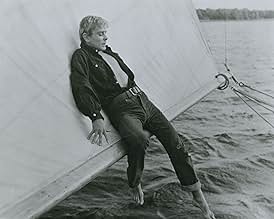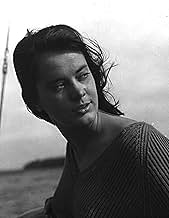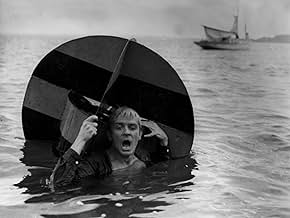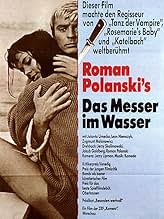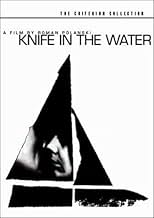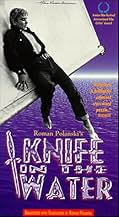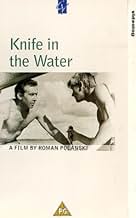NOTE IMDb
7,4/10
25 k
MA NOTE
En route pour un voyage en bateau, un homme et une femme âgés invitent un jeune auto-stoppeur emphatique.En route pour un voyage en bateau, un homme et une femme âgés invitent un jeune auto-stoppeur emphatique.En route pour un voyage en bateau, un homme et une femme âgés invitent un jeune auto-stoppeur emphatique.
- Réalisation
- Scénario
- Casting principal
- Nommé pour 1 Oscar
- 1 victoire et 2 nominations au total
Anna Ciepielewska
- Krystyna
- (voix)
- (non crédité)
Roman Polanski
- Young Man
- (voix)
- (non crédité)
Avis à la une
WELL,you can defined this great film just by one particular scene: the old man is rich,have good social position and took the boy on board to play the role of his mentor.However the young man was dragging the beautiful knife,which was_as he claimed_ the most important thing in his life.The guy was always playing the knife between his fingers and the old man was jealous about that.So when the boy went inside the yacht leaving the knife,the old man took the knife and tried to do the same.Suddenly the young appear and saw this.The only way for the old man to get away with some honour was to allow the boy do the play:he played the knife between the old man's fingers,looking straight into his eyes.Well the lady at the same time was swimming using a funny rubber cocodrile.So, imagine this beautiful scene with the knife,all the tension and suddenly we hear the woman shouting:'Andrzej, Andrzej,the cocodrile is making the bubbles',huh,when I was in the cinema the whole audience burst laughting after hearing that!. The woman stays in the background, just think why? There's another great funny shot when the woman lays there for a sunbathe with her small bikinis,well, her breast dominates the scene!. is the waving movement of the yacht who creates the sensual scene!.
Of course this scene was part of the longer plot ,the critics described this `knife scene' as the most famous and symbolic scene in all of Polanski films..Zygmunt Malanowicz,the actor who played the part of the young man said that he practice a lotnfor those scenes,polanski was afraid if he was prcticing long enough,finally everything was Ok.As Leon Niemczyc,the actor who played the mature role said" Malanowicz only gave me sligh scars'.The idea of the film was the strange competition between this two men.the jury and the prize was the woman.Polanski said he needed a actress that looked plain and normal in ordinary dress but intriguing in bikini!.
Polanski was not only interested in this kind of personages,he likes the relantionship between' the master and the servant' The domineering and the repressed ,as we can see in his short film' The Fat and the Lean' (1961, B&W, 15mins) or in features like Knife in the Water (1962); Cul-de-sac (1966);Dance of the Vampires(1967) etc.
Of course this scene was part of the longer plot ,the critics described this `knife scene' as the most famous and symbolic scene in all of Polanski films..Zygmunt Malanowicz,the actor who played the part of the young man said that he practice a lotnfor those scenes,polanski was afraid if he was prcticing long enough,finally everything was Ok.As Leon Niemczyc,the actor who played the mature role said" Malanowicz only gave me sligh scars'.The idea of the film was the strange competition between this two men.the jury and the prize was the woman.Polanski said he needed a actress that looked plain and normal in ordinary dress but intriguing in bikini!.
Polanski was not only interested in this kind of personages,he likes the relantionship between' the master and the servant' The domineering and the repressed ,as we can see in his short film' The Fat and the Lean' (1961, B&W, 15mins) or in features like Knife in the Water (1962); Cul-de-sac (1966);Dance of the Vampires(1967) etc.
In Polanski's feature debut, "Knife in the Water," strange power games were again to the fore, with ridiculous macho rivalries arising when a young looking man hitches a lift with a sportswriter and his attractive wife
Though the plot itself is slim, the film is distinguished by Polanski's precise visuals, which point the shifts in allegiance between the three characters through subtle groupings; impressively, although almost the whole film is situated on a small yacht, the effect is always cinematic rather than theatrical
Polanski's film is implicit, ingenious, mesmerizing, and has artistic integrity It is filled with a very different sort of suspense There is no violence The suspense is hinted at, suggested, refined tautly, glimpsed, did-he-mean-what-I-think-he-meant?
The rich man's confidence was in his possessions, among which was numbered his attractive wife, lying in bikini, teasing by arousing expectations between them on the deck The student's confidence, casual, almost unaware, was in his very being... The husband resented the youth, the strength, the "cool," the easy virility of the student and worked out a compulsion to keep challenging them, to try to show his superiority
Polanski was fair each had his own strengths and skills; but the one obsessively resented the others
Polanski's film is implicit, ingenious, mesmerizing, and has artistic integrity It is filled with a very different sort of suspense There is no violence The suspense is hinted at, suggested, refined tautly, glimpsed, did-he-mean-what-I-think-he-meant?
The rich man's confidence was in his possessions, among which was numbered his attractive wife, lying in bikini, teasing by arousing expectations between them on the deck The student's confidence, casual, almost unaware, was in his very being... The husband resented the youth, the strength, the "cool," the easy virility of the student and worked out a compulsion to keep challenging them, to try to show his superiority
Polanski was fair each had his own strengths and skills; but the one obsessively resented the others
Polanski's first feature. Hmmmmm..... This film is a study of macho rivalry, sexual tension and establishing who is the alpha male. I felt strangely unfulfilled after the film, I guess I was expecting something darker or more serious to happen, but it never did.
Don't get me wrong there is some excellent acting by the Polish cast as well as some innovative camera work. The tension between the rich, older Andrzej and the exuberant, free spirited young man (you aren't told his name) is evident from the first time they meet. This carries over on to the boat where Andrzej takes every opportunity to play captain, ordering the young man around in an attempt to demean and humiliate him. Eventually things turn to hostility with the young attractive wife trying to placate the two.
Not bad for a first feature, a good springboard for Polanski as we all know he went on to better things from here.
Don't get me wrong there is some excellent acting by the Polish cast as well as some innovative camera work. The tension between the rich, older Andrzej and the exuberant, free spirited young man (you aren't told his name) is evident from the first time they meet. This carries over on to the boat where Andrzej takes every opportunity to play captain, ordering the young man around in an attempt to demean and humiliate him. Eventually things turn to hostility with the young attractive wife trying to placate the two.
Not bad for a first feature, a good springboard for Polanski as we all know he went on to better things from here.
There is nothing more thrilling than discovering a natural filmmaker for the first time. There are only so many, and you can only have menarche once. Its an introduction into another life.
I first saw this in 1965 at the Orson Welles Cinema near Harvard Square. We were told it was made behind the backs of Iron Curtain thugs, only surviving because of international attention. (I wouldn't meet Tarkovsky or Kieslowski until later.) And that it was made by the fellow who had made the striking "Repulsion," which at that time was anticipated but yet unseen in the States.
I've since learned some striking things: that both Polanski and his co-writer wanted to play the hitchhiker and indeed it is Polanski's voice. And that the mistress who seems only half alive was in fact played by a non-actress they found by looking at swimming pools. Also that the situation was suggested by a long planned and discussed Orson Welles project ("The Deep") that was started after this and never completed.
The writing is good of course, especially the central image the title denotes, but the camera finds the perfect place always. It is like Altman's camera (after this) that discovers the action rather than, say Spielberg's where the action is obviously happening in such a way to be cleanly seen by the camera. And so much harder on a boat!
But the interesting thing about such an introduction to a filmmaker is the relationship that follows: we know certain things about how he thinks and sees. We expect the conversation to continue and mature over the years. And what a rocky ride this man has taken us on, through perfectly created worlds (in which I include "Ninth Gate") but also through pure dreck and rank sentimentality (both of which tag "The Pianist").
Sometimes he's internal to the narrative, even the charmed actor. Sometimes he is outside the narrative, pulling strings (as with this film) but sometimes it is clear he never got out of bed.
As with Kubrick and so many others, you really must start at the beginning, which essentially means here.
Ted's Evaluation -- 3 of 3: Worth watching.
I first saw this in 1965 at the Orson Welles Cinema near Harvard Square. We were told it was made behind the backs of Iron Curtain thugs, only surviving because of international attention. (I wouldn't meet Tarkovsky or Kieslowski until later.) And that it was made by the fellow who had made the striking "Repulsion," which at that time was anticipated but yet unseen in the States.
I've since learned some striking things: that both Polanski and his co-writer wanted to play the hitchhiker and indeed it is Polanski's voice. And that the mistress who seems only half alive was in fact played by a non-actress they found by looking at swimming pools. Also that the situation was suggested by a long planned and discussed Orson Welles project ("The Deep") that was started after this and never completed.
The writing is good of course, especially the central image the title denotes, but the camera finds the perfect place always. It is like Altman's camera (after this) that discovers the action rather than, say Spielberg's where the action is obviously happening in such a way to be cleanly seen by the camera. And so much harder on a boat!
But the interesting thing about such an introduction to a filmmaker is the relationship that follows: we know certain things about how he thinks and sees. We expect the conversation to continue and mature over the years. And what a rocky ride this man has taken us on, through perfectly created worlds (in which I include "Ninth Gate") but also through pure dreck and rank sentimentality (both of which tag "The Pianist").
Sometimes he's internal to the narrative, even the charmed actor. Sometimes he is outside the narrative, pulling strings (as with this film) but sometimes it is clear he never got out of bed.
As with Kubrick and so many others, you really must start at the beginning, which essentially means here.
Ted's Evaluation -- 3 of 3: Worth watching.
While driving to sail with his wife Krystyna (Jolanta Umecka) in his yacht, the arrogant and wealthy Andrzej (Leon Niemczyk) "stumbles" with a drifter (Zygmunt Malanowicz) in front of his car hitchhiking on the lonely road. Andrzej gives a ride to the young man with despisal. When they reach the marina, Andrzej unexpectedly and without any reason invites the young man to sail with them, initiating a tense dispute of power with the youth, in a claustrophobic and erotic environment.
"Nóz w Wodzie" is a claustrophobic, tense and erotic little movie of the earlier career of Polanski. The simple story is supported by a magnificent cinematography and camera work with unusual angles, and great performances of the lead cast. The Brazilian DVD shamefully misses many subtitles, leaving without translation many sentences in the dialogs. I immediately recall at least two movies that used concepts of this screenplay: "Dead Calm" and the open end of Adrian Lyne"s "Unfaithful". My vote is seven.
Title (Brazil): "Faca na Água" ("Knife in the Water")
"Nóz w Wodzie" is a claustrophobic, tense and erotic little movie of the earlier career of Polanski. The simple story is supported by a magnificent cinematography and camera work with unusual angles, and great performances of the lead cast. The Brazilian DVD shamefully misses many subtitles, leaving without translation many sentences in the dialogs. I immediately recall at least two movies that used concepts of this screenplay: "Dead Calm" and the open end of Adrian Lyne"s "Unfaithful". My vote is seven.
Title (Brazil): "Faca na Água" ("Knife in the Water")
Le saviez-vous
- AnecdotesThe first scene in the film shows Andrzej and Krystyna driving a car. As shooting from the platform in front of the car was not yet available, the crew was tied to the car, standing on its mask. To get the proper light effects, they held a blanket with a small hole for the camera. Leon Niemczyk (Andrzej) was really driving this car quite fast (this was crucial to this scene), but he couldn't see anything. He drove the car using the tops of the trees to imagine where the road is.
- GaffesWhen the young boy is trying to stabilize the Christine by hanging off its side, the railing of the camera boat can be seen in the lower left-hand corner of the screen.
- ConnexionsEdited into Spisok korabley (2008)
Meilleurs choix
Connectez-vous pour évaluer et suivre la liste de favoris afin de recevoir des recommandations personnalisées
- How long is Knife in the Water?Alimenté par Alexa
Détails
- Durée
- 1h 34min(94 min)
- Couleur
- Mixage
- Rapport de forme
- 1.37 : 1
Contribuer à cette page
Suggérer une modification ou ajouter du contenu manquant

